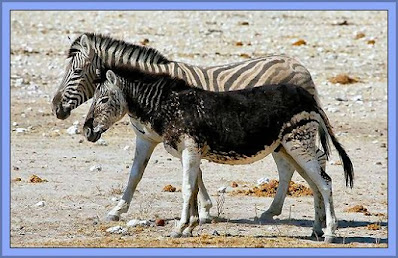 |
| Avoiding Change Can Be A Good Strategy ..... |
But when you think about that, its only possibly arguable from a group or species point of view. i.e. We have progressed and survived as a species, only because some individuals have been the 'risk takers' and shown us the new ways in which we could survive and prosper.
But equally, for those groups who followed a risk taker who got it wrong, disaster followed and they were either set back, or even eradicated from humanities gene pool. A good example of a risk taker who led his group to eventual disaster is Herr Adolf Hitler, who led the Germans into self created Gotterdammerung by 1945. He gambled on numerous occasions, and could have got off the risky behaviour several times with palpable wins for himself and his group, but didn't because he was a risk taker by nature.
Similarly some groups didn't make it at all in the race to develop and expand .... e.g. the aborigines of Australia and Papua New Guinea, who despite some PC historical revisionism, which now describes them as having a 'rich deep and vibrant culture and civilisation', were actually underdeveloped, and stuck in a permanent and rather primitive 'stone age' i.e. a cultural level of development that ended between 6,000 BC and 2,500 BC in the rest of the world. They had only survived at all because of their isolation ... someone, if not the Europeans then the Polynesians or even Indonesians would have landed and with much the same result (or worse) for them as the European landings.
 |
| Cautious Risk Taking ... The Middle Way |
But for individuals, risk taking is, well, high risk. For every risk taker who succeeds and leads their group to a new success, there are at least as many who have failed (and often died). So that could easily be a more than 50% failure rate at an individual level.
We only celebrate the risk takers who succeed ... 'High Flyers' ... 'Over Achievers' ... 'Success Stories', and all those who followed them. We forget that as a survival strategy, being the careless risk taker is actually a poor option.
 |
| Black Zebra |
Like being the only all black zebra in the herd .....

Were the Neanderthals non risk takers? and if they were, is that the reason they died out? (which they didn't, as we are, in part, their descendants).
ReplyDeleteI certainly agree that it's the second mouse that gets the cheese and that we tend not to talk about those risk takers that fail. Risk takers or not, we are the descendants of life's winners. I suspect that more of these winners were "tortoises" and that it doesn't matter whether the adrenaline junky breeds before his parachute fails to open, as evolution will continue to produce them regardless and the rest of us will continue to profit from their successes and failures.
Interesting piece.
We are only 3 to 4% related to them ... and that incompatibilities in the DNA of Neanderthals and modern humans, may have limited the impact of interbreeding between the two groups. However amongst the very many suggestions on why they became extinct e.g. one study of Neanderthal skulls suggested that they became extinct because they had larger eyes than our species. As a result, more of their brains were devoted to seeing in the long, dark nights in Europe, at the expense of high-level processing i.e. intelligence.
Delete.... Is the idea that they couldn't cope with climatic change and competition from Homo-sapiens. This suggests that they lacked the risk takers, who could have led them to the more successful survival strategies that Homo-sapiens must have adopted, when faced with the same two factors.
They are gone, their last in Gibraltar, while we are not .... for now.
The strategies that we employed may have been risk taking, or not, who knows? I suppose that one could argue that any new strategy is a risk, even if it's pretending to be dead instead of fleeing, the important thing is whether it works or not. It's just like the phrase "survival of the fittest" where fittest doesn't mean strongest or fastest but best adapted.
DeleteSurely homo-sapiens leaving Africa, spreading across the globe and being the only human species left, suggests that we are intrinsically a risk taking species (even if it doesn't always work out).
Delete